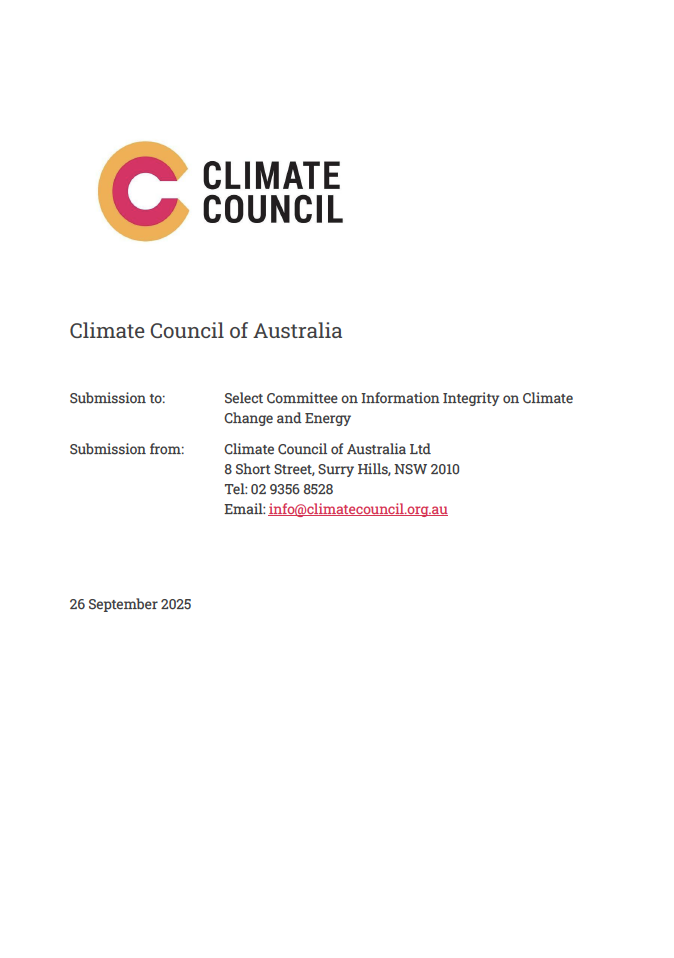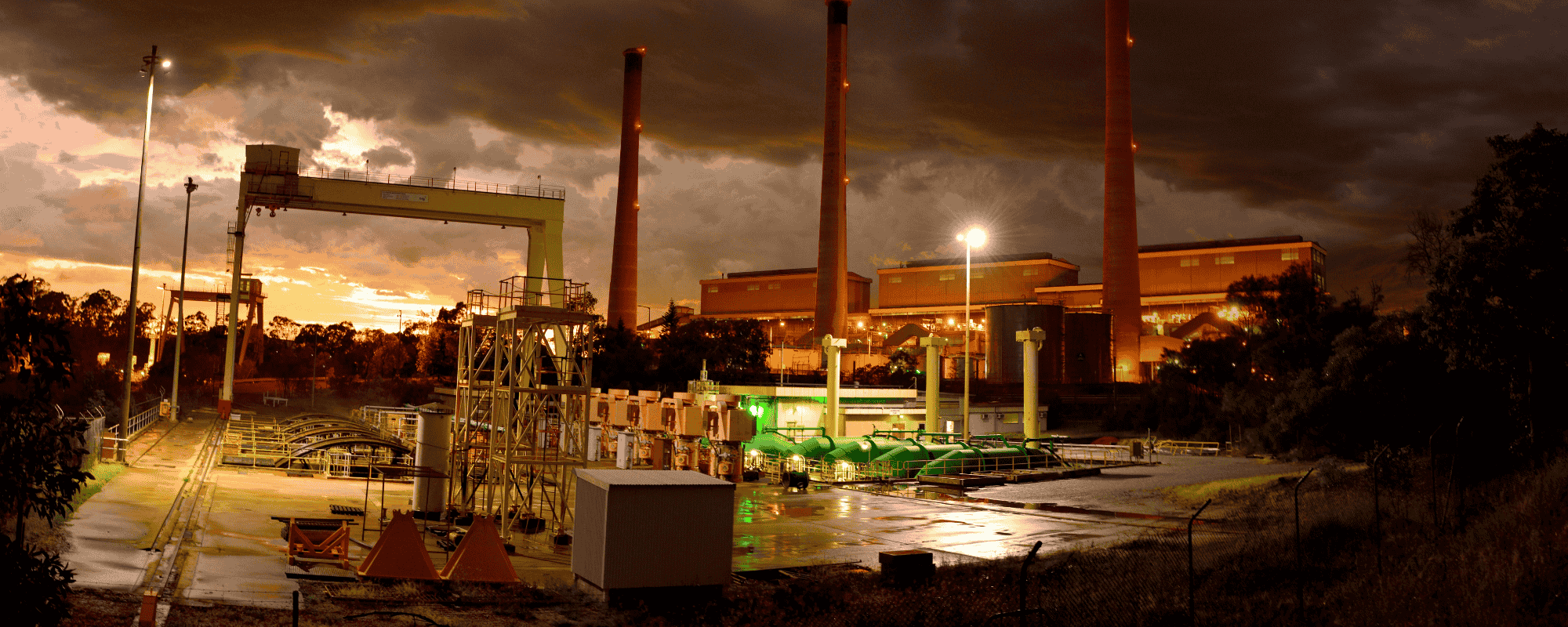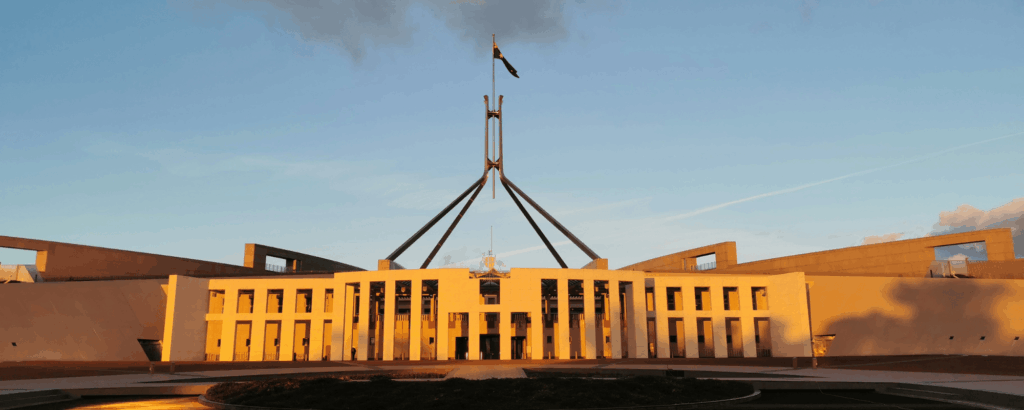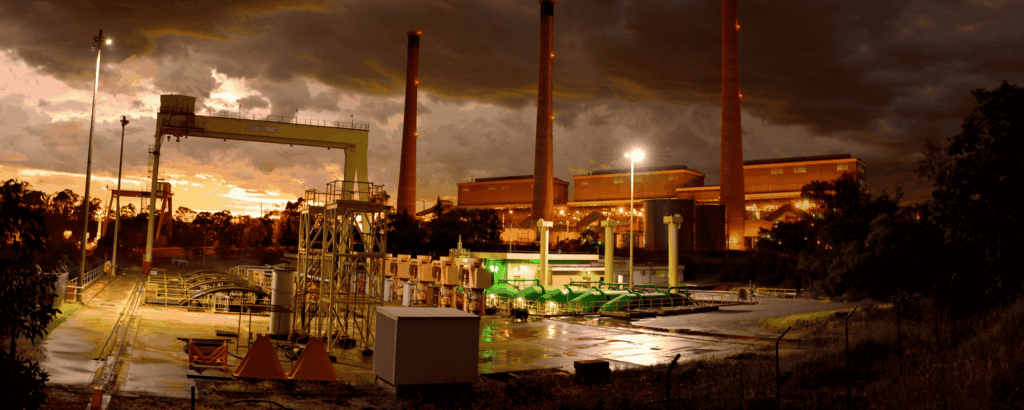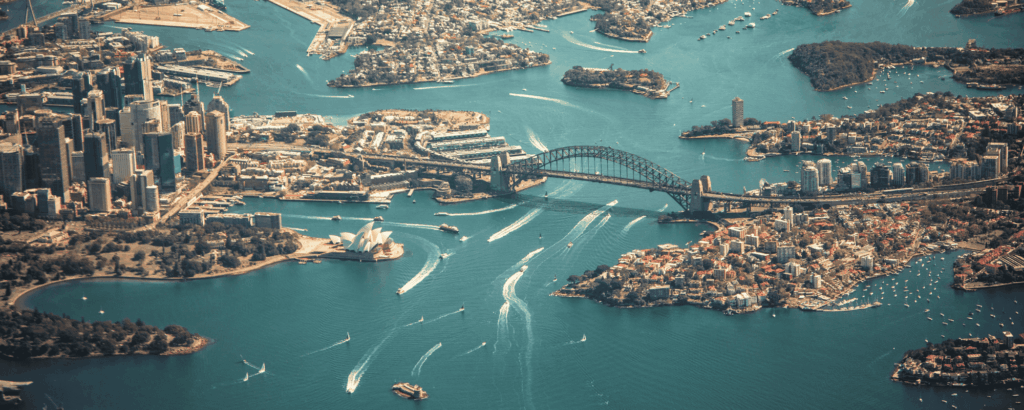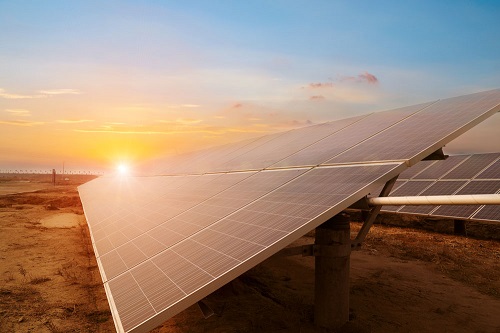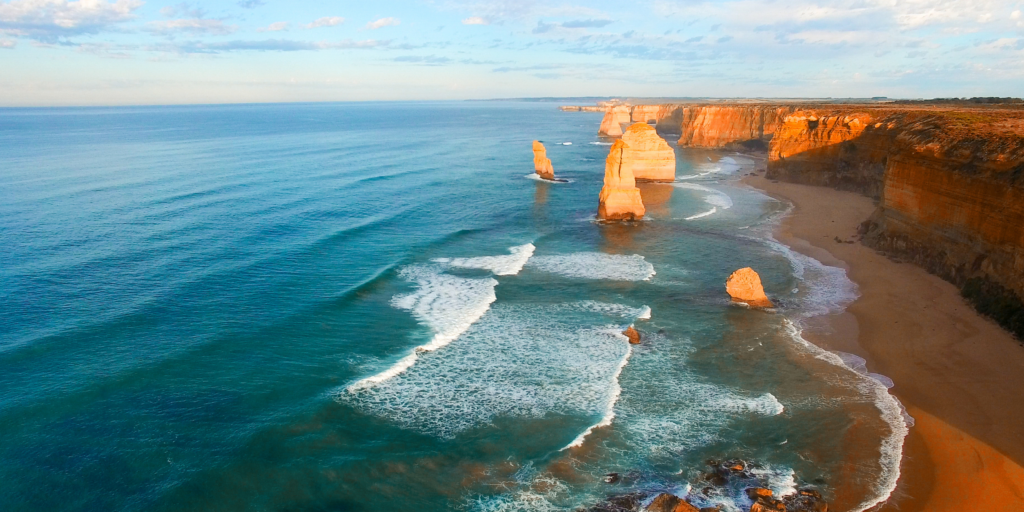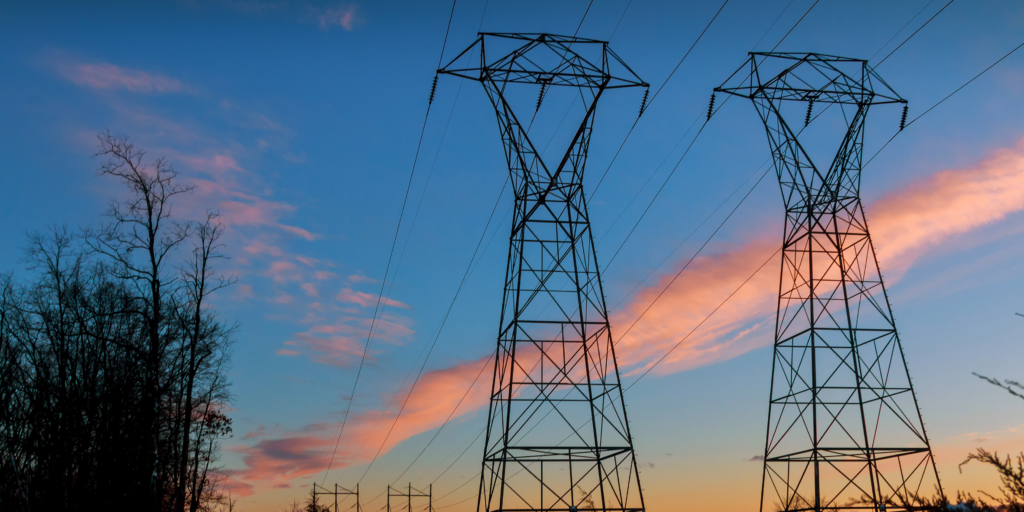The Climate Council welcomes the Select Committee on Information Integrity on Climate Change and Energy’s inquiry into climate and energy misinformation and disinformation. As one of Australia’s most prominent and trusted voices on climate science, impacts and solutions, we are dedicated to elevating evidence-based information to shape the national conversation about the climate crisis.
Australians are already living with more frequent and severe fires, floods and heatwaves, driven by escalating climate pollution. Yet persistent mis- and disinformation about climate science, renewable energy and the energy transition continues to distort public debate, undermine community confidence, and delay essential action. These campaigns—often amplified by actors with vested interests—have real-world consequences: they slow investment, increase costs, and leave communities more exposed to risk.
For a decade, non-government organisations like the Climate Council have filled an information gap. Born from the community response to the abolition of the former Climate Commission in 2013, we have produced hundreds of independent, evidence-based publications and engaged thousands of media stories to help Australians make informed decisions. But the scale and sophistication of today’s information harms demand co-ordinated national leadership.
The Australian Government now has both the responsibility and opportunity to strengthen information integrity. Australians need clear, reliable information about how the energy transition affects households, regions and jobs; and our electoral and advertising rules must reflect contemporary expectations so people can vote on facts, not falsehoods.
The National Climate Risk Assessment released this month underscores what is at stake: climate change threatens our way of life across every sector and region. Australia will only meet this challenge by rapidly cutting pollution from coal, oil and gas and scaling clean energy — and by tackling mis- and disinformation that erodes trust in the solutions we need.
findings
- Misinformation and disinformation are widespread across Australian media and politics, and have become a major barrier to effective climate action – undermining public trust in science, skewing public debate and delaying coordinated policy development.
- Climate mis- and disinformation in Australia is not isolated or incidental. It is systematic and well-funded. For decades, fossil fuel interests and allies have seeded false narratives to protect their commercial positions and profits.
- Astroturfing has become a defining tactic in Australia’s climate disinformation landscape, distorting democratic debate by presenting orchestrated, funded campaigns as authentic, grassroots community opposition.
- Major Australian organisations responsible for spreading climate misinformation are linked to coordinated international networks, amplifying reach and influence.
- Bots, trolls and inauthentic accounts accelerate the spread of climate mis- and disinformation, shaping the national narrative and drowning out credible information.
- For too long, combating mis-and disinformation has been left to non-government organisations. Leadership from the Australian Government is urgently needed in tackling this serious issue.
- Australians need transparent, accessible and reliable information on how the energy transition impacts them. They need confidence that they are voting on facts, not falsehoods; and the Government needs to tackle the dangerous spread of misinformation through bots, trolls and inauthentic social media accounts.
RecommendationS
Establish Local Energy Hubs to provide communities with accessible, tailored, accurate information about what renewables mean for their region
The current top-down approach to planning and delivery of renewable energy projects often leaves communities feeling excluded from decision-making. This lack of agency can create distrust, fuel fears, and leave space for mis- and disinformation to spread unchecked. To address this, the Australian Government should work with state and local governments to establish Local Energy Hubs within Renewable Energy Zones (REZs). These hubs would:
- Serve as trusted, independent sources of information tailored to local contexts, ensuring communities can easily access clear and factual explanations of what renewable projects mean for their region.
- Provide a point of contact for residents seeking advice and answers, reducing the influence of misinformation circulating on social media and in local networks.
- Act as an intermediary between renewable energy developers and local communities, improving transparency, fostering dialogue, and building trust in the planning process.
- Facilitate structured opportunities for communities to give input on large-scale renewable projects, ensuring that feedback is considered early and meaningfully.
By embedding reliable, locally tailored information within communities, Energy Hubs can help prevent the spread of mis- and disinformation, build social licence for renewable projects, and ensure communities see themselves as partners rather than bystanders in Australia’s energy transition. The Local Energy Hubs campaign is backed by more than 65 organisations, from community groups to peak environment and industry bodies (RE-Alliance 2025).
Reform political donation and advertising laws to ensure Australians can make informed decisions at the ballot box
Australians deserve a fair, transparent democracy where decisions are not distorted by vested interests or hidden money. In February this year, the biggest changes to our electoral funding laws in decades were passed in a deal between Labor and the Coalition. While the amendments include some welcome changes such as lower disclosure thresholds, they will severely limit the ability of not-for-profits like the Climate Council to advocate and counter the spread of mis- and disinformation during election periods, through a provision that prevents the use of untied or general donations for use on electoral advocacy. At the same time, the changes do little to crack down on the real threat to democracy: the influence of vested interests and big corporate donors.
The problems with Australia’s electoral funding laws are compounded by the fact that there is no requirement for truth in political advertising. The Electoral Act prohibits the publication of material likely to mislead or deceive Australians only after an election has been called. An election campaign often begins well before an election is officially called, yet outside that window there is no requirement for political advertising to be factual, leaving voters exposed to unchecked misinformation. Polling by The Australia Institute shows that 89% of Australians support the introduction of truth in political advertising laws (The Australia Institute 2025).
Despite recent attempts by independents Kate Chaney, Zali Steggall and David Pocock to deliver desperately needed reforms, our laws continue to lag behind community expectations. Before the next Federal Election, due in 2028, the Australian Government should introduce – or support – legislation to restore integrity to Australia’s democracy, curb the influence of vested interests, including the fossil fuel industry, and ensure voters have access to accurate information. Key reforms include:
- Increase transparency of political donations, including lower disclosure thresholds, caps on expenditure and real-time disclosure, so Australians can clearly see who is funding campaigns against climate action.
- Pass truth in political advertising laws – like those recently introduced into Parliament by Zali Steggall MP and Senator David Pocock– requiring campaign ads to be factual and empowering an independent body to undertake compliance activities.
- Repeal restrictions that limit charities and community organisations from engaging in public debate during election periods, ensuring non-government organisations like the Climate Council can continue to provide accurate, evidence-based information on issues of significant public interest.
Identify and implement appropriate mechanisms to improve regulation and management of bots, trolls and inauthentic accounts on social media
Bots and trolls regularly amplify misleading climate denial and anti-renewable narratives. Bots use sophisticated techniques to avoid detection, and it is often extremely difficult to identify them. Support from social media platforms, where it exists at all, is negligible in effect, and has deteriorated since the removal of fact-checking from Meta and X/Twitter.
Given the challenges in identifying bot accounts, any actions to address this issue should be informed by consultation with industry, and learnings from existing work in Australia and overseas, to ensure measures are practical and achievable. Existing work in Australia includes the Australian Communications and Media Authority’s (ACMA) voluntary arrangements to combat mis- and disinformation, Australian Electoral Commission’s Disinformation Register and work of the eSafety Commissioner.
Action to address this issue could include developing legislation to require platforms to remove bot accounts that impersonate humans, and clearly label all legitimate bot accounts, as recommended by Senator David Pocock last year (Parliament of Australia 2024).
Climate mis- and disinformation in Australia is not isolated or incidental; it is systematic, well funded and increasingly coordinated across borders. For decades, fossil fuel interests and their allies have seeded false narratives to protect profits, now amplified by ostensibly “independent” groups with clear links to industry and partisan politics. These campaigns manufacture fear and division, erode trust in science, and slow the rollout of clean energy projects essential to reducing risk to Australian lives, livelihoods and ecosystems. With high-profile global figures and political leaders continuing to deny climate science, the risk is growing. Without decisive government action to strengthen information integrity and ensure communities can access evidence-based, factual information, mis- and disinformation will continue to undermine our democracy and stall the urgent clean-energy transition Australia needs to reduce climate harms and create a safer, more prosperous future.
